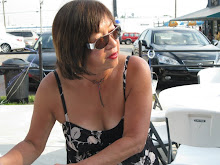

Who is Henrietta Lacks?
I am sure many people would not know who she is.
Her cells revolutionized research and enabled
the polio vaccine to be developed. Her immortal cells
are very important in just about every research about
how cells work and the testing for every treatment
of diseases. These are things we learned in our last
book entitled, "The Immortal Life Of Henrietta Lacks".
These cells keep on living even though the donor died in
1951 of cervical cancer and multiply so rapidly that they
were sold to researchers worldwide while some companies
have made huge profits.
Her family were not aware of this until a reporter
Rebecca Skloot decided to write a book about this
phenomena. They were never compensated in any way.
The mother was a poor, black, tobacco sharecropper.
Skloot devoted 10 years in researching this book and
had difficulty gaining the family's trust.
So the book has a technical side which I must admit
I might have absorbed very little of and a human side
with the family's story. She had five children.
There were 9 members present last night to discuss.
Madeleine, Kathy W., Diana, Betsy, Donna R, Donna S., Sarah, Julie
and I were there. We had all read the book except for Donna Smith.
In general, we agreed it was not the most exciting book but we
learned so much. Even Sarah who had worked with these "HeLa" cells
when she was in graduate school did not know the whole story behind
the donor until she read the book. Some people loved it.
We discussed whether scientists have a right to use cast
offs from surgical procedures in research. Who owns tissues? Do
we need a waiver in place to ban use and what monetary rights do
people have if a breakthrough produces profits?
Personally I would not need to take my appendix home in a bottle.
Wouldn't research be stymied if all these legal issues were put
in place?
We did not think the Lacks family was owed anything but it was
just simply ironic that none of them could afford health insurance when
their mother's cells effected so many cures. Thankfully the author set
up a scholarship fund for the grandchildren and acknowledgement
seems to be forthcoming since the publication of the book.
We did think the family needed acknowledgement and answers
to their many questions as they were totally ignorant of all
that was being done with the cells.
Donna Smith chose, "Sarah"s Key" by Tatiana de Rosnay
and December 8th was decided to be the next meeting.
and December 8th was decided to be the next meeting.
